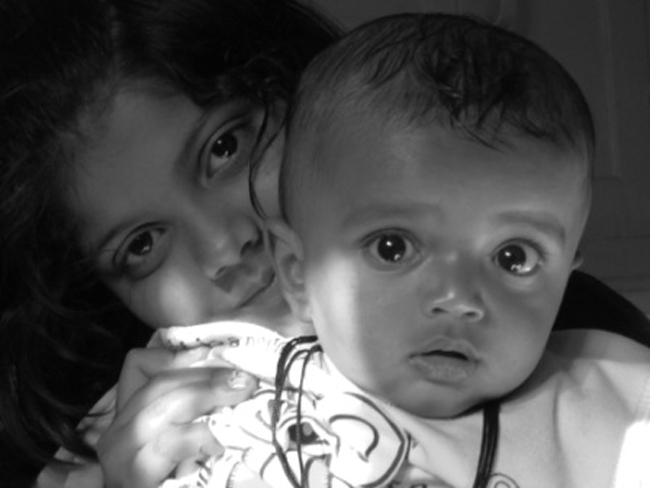
It’s impossible to miss all the reminders that flu season is here, from ads at your local pharmacy to gentle reminders to cover up when you cough or sneeze.
But it’s not the only viral game in town. Young children and people who live with respiratory illness such as asthma face an equally potent bug every winter.
Respiratory Syncytial Virus, or RSV, is serious and highly contagious. There’s no vaccination around to keep your little one from catching it. And its seasonal duration is longer in Florida than in any other state, stretching from mid-August to March.
Pediatricians and parents who have seen RSV up close say if you don’t watch out for runny noses and other clues, your little one could be more than miserable for weeks.
Evan Lewis needs one final checkup before Dr. David Rosenberg is ready to let him leave St. Joseph’s Children’s Hospital in Tampa. The 9-year-old boy has been here a week, fighting the RSV that’s aggravated his asthma. The pediatric pulmonologist listens with his stethoscope to make sure Evan’s breaths are strong enough that he finally can sleep in his own bed.
“He had influenza first… (and) he has a history of asthma, and then he had RSV,” Rosenberg said as the boy coughed repeatedly. “So normally people don’t think about RSV in ‘older’ patients, but he’s an example where you can get an older patient and if you have underlying breathing issues, it can cause you to be in the hospital.”
Despite regular wet, raspy coughs, Evan is good to go. But the 9-year-old knows his asthma keeps him at risk for a virus that affects mostly babies not yet a year old. At St. Joseph’s right now, they treat roughly three-to-five babies a day for RSV. And the risk that the virus might spread is serious enough that nurses, doctors and visitors wear protective gowns and surgical masks to keep from sharing RSV with other kids.
 Each year, RSV hospitalizes up to 172,000 American children younger than five, according to the Centers for Disease Control and Prevention. The danger is real because no one is immune from getting RSV. It’s just that babies and children with weak respiratory systems can’t fight it as well as grown-ups.
Each year, RSV hospitalizes up to 172,000 American children younger than five, according to the Centers for Disease Control and Prevention. The danger is real because no one is immune from getting RSV. It’s just that babies and children with weak respiratory systems can’t fight it as well as grown-ups.
And while it may seem like a cold the first few days, Rosenberg warns that RSV is anything but.
“Some children develop a high fever, some do not. But it seems that having the profuse runny nose…that seems like it’s the worst cold they’ve ever seen is a key to it,” he said. “And then of course if they start wheezing, breathing rapidly, they need to seek medical attention as soon as possible.”
Florida’s Department of Health follows RSV year round, tracking cases in a dozen hospitals across the state. From August to mid-January, that handful of hospitals reported more than 2,900 cases, a rate slightly higher than the same period a year ago.
RSV also is the most common lower respiratory illness for babies younger than one, the CDC says. That’s partly because parents can have a tough time spotting any difference between a cold, the flu or RSV.
And babies can’t explain how sick they feel beyond a miserable cry. But older children can offer parents a little insight. Evan Lewis had the flu a year ago, but was back to normal in a week. He said this time was different.
“Well I was coughing a lot and I felt like I had a really high fever. So I went to the doctor and they told us to go to the hospital,” he said. “…I just felt really lazy and miserable and I just wanted to go to sleep a lot. And I didn’t feel very active.”
Evan’s mom says he was so tired he didn’t even want to play video games: his usual obsession. That’s when Teresa Lewis knew her son needed serious medical attention.
“The difference this time was that in addition to the coughing was the very high fevers, the 104, which I had never seen before,” she said.
It’s hard to say where Evan or any person catches RSV. Rosenberg says the virus travels via secretions. It can lurk for hours on toys, doorknobs or countertops, making day care centers and other busy places especially dicey.
“RSV is spread by contact of the virus by secretions, so nasal secretions, oral secretions, secretions even from the eye are very contagious,” he said. “And you have to wash your hands very well when you are dealing with these secretions.”
That’s right: basic hygiene is the best prevention. Right now there’s no RSV vaccine around that is comparable to a flu shot. The closest option so far is a monthly injection given to infants with lung disease and congenital heart disease. It costs $2,000 a dose.
That’s why Teresa Lewis will keep wiping down counters and doorknobs at home. Evan’s asthma already puts him at risk. So she says the best she can do is pester him about washing hands and coughing and sneezing into his elbow.
“They’re in school,” she said. “So, there’s not much you can do to prevent them from coming in contact with the other kids.”
And after a week in the hospital, Evan says he’s ready to head home and heed that advice. In this situation, Mom does know best.
–Mary Shedden, Health News Florida





























Leave a Reply